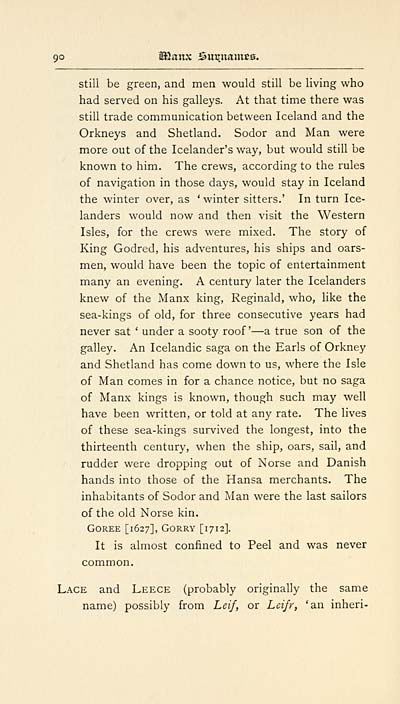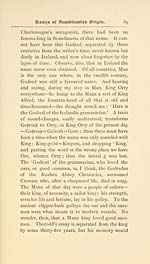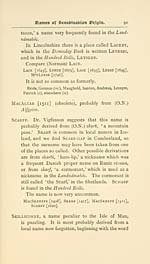Download files
Complete book:
Individual page:
Thumbnail gallery: Grid view | List view

90 Manx Suxtuame©.
still be green, and men would still be living who
had served on his galleys. At that time there was
still trade communication between Iceland and the
Orkneys and Shetland. Sodor and Man were
more out of the Icelander's way, but would still be
known to him. The crews, according to the rules
of navigation in those days, would stay in Iceland
the winter over, as ' winter sitters.' In turn Ice-
landers would now and then visit the Western
Isles, for the crews were mixed. The story of
King Godred, his adventures, his ships and oars-
men, would have been the topic of entertainment
many an evening. A century later the Icelanders
knew of the Manx king, Reginald, who, like the
sea-kings of old, for three consecutive years had
never sat ' under a sooty roof — a true son of the
galley. An Icelandic saga on the Earls of Orkney
and Shetland has come down to us, where the Isle
of Man comes in for a chance notice, but no saga
of Manx kings is known, though such may well
have been written, or told at any rate. The lives
of these sea-kings survived the longest, into the
thirteenth century, when the ship, oars, sail, and
rudder were dropping out of Norse and Danish
hands into those of the Hansa merchants. The
inhabitants of Sodor and Man were the last sailors
of the old Norse kin.
GOREE [1627], GORRY [1712].
It is almost confined to Peel and was never
common.
Lace and Leece (probably originally the same
name) possibly from Leif, or Lei/r, 'an inheri-
still be green, and men would still be living who
had served on his galleys. At that time there was
still trade communication between Iceland and the
Orkneys and Shetland. Sodor and Man were
more out of the Icelander's way, but would still be
known to him. The crews, according to the rules
of navigation in those days, would stay in Iceland
the winter over, as ' winter sitters.' In turn Ice-
landers would now and then visit the Western
Isles, for the crews were mixed. The story of
King Godred, his adventures, his ships and oars-
men, would have been the topic of entertainment
many an evening. A century later the Icelanders
knew of the Manx king, Reginald, who, like the
sea-kings of old, for three consecutive years had
never sat ' under a sooty roof — a true son of the
galley. An Icelandic saga on the Earls of Orkney
and Shetland has come down to us, where the Isle
of Man comes in for a chance notice, but no saga
of Manx kings is known, though such may well
have been written, or told at any rate. The lives
of these sea-kings survived the longest, into the
thirteenth century, when the ship, oars, sail, and
rudder were dropping out of Norse and Danish
hands into those of the Hansa merchants. The
inhabitants of Sodor and Man were the last sailors
of the old Norse kin.
GOREE [1627], GORRY [1712].
It is almost confined to Peel and was never
common.
Lace and Leece (probably originally the same
name) possibly from Leif, or Lei/r, 'an inheri-
Set display mode to: Large image | Transcription
Images and transcriptions on this page, including medium image downloads, may be used under the Creative Commons Attribution 4.0 International Licence unless otherwise stated. ![]()
| Early Gaelic Book Collections > Blair Collection > Surnames & place-names of the Isle of Man > (108) |
|---|
| Permanent URL | https://digital.nls.uk/82100944 |
|---|
| Description | A selection of books from a collection of more than 500 titles, mostly on religious and literary topics. Also includes some material dealing with other Celtic languages and societies. Collection created towards the end of the 19th century by Lady Evelyn Stewart Murray. |
|---|
| Description | Selected items from five 'Special and Named Printed Collections'. Includes books in Gaelic and other Celtic languages, works about the Gaels, their languages, literature, culture and history. |
|---|

